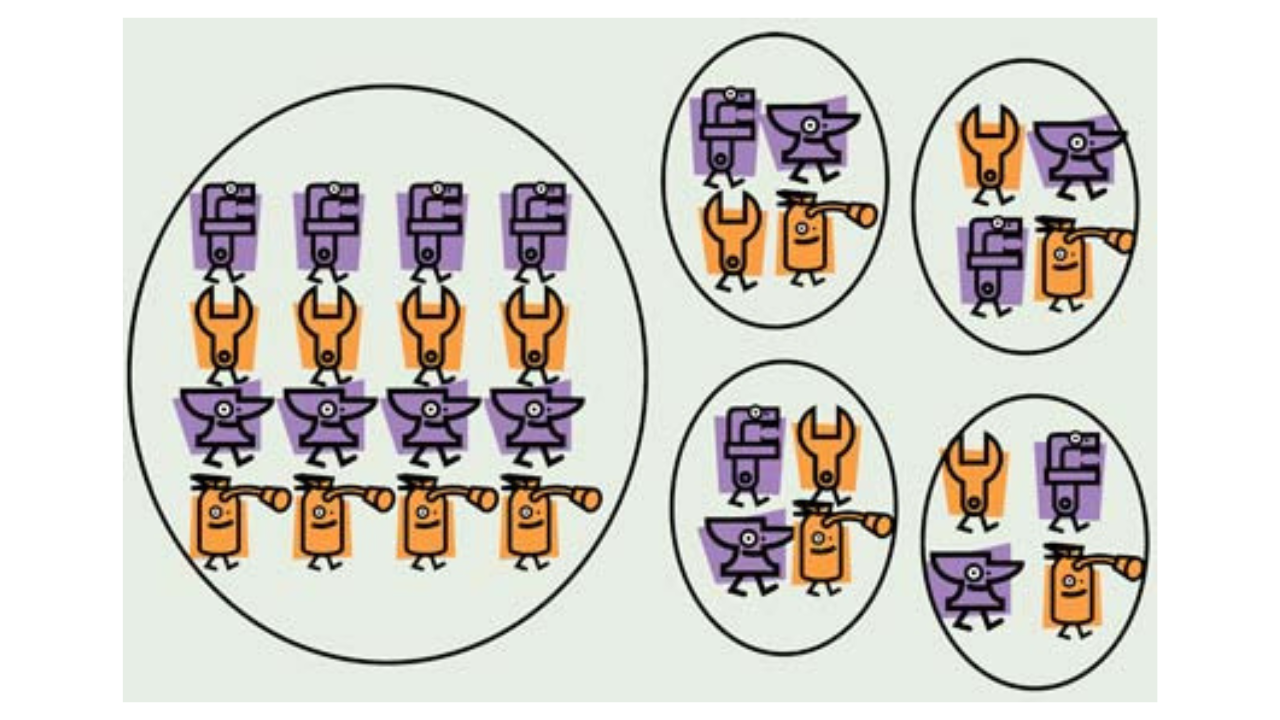Improve Basic Work Systems First
Christer Idhammar, IDCON INC
Many organizations spend too much time searching for—and starting implementation of—new reliability and maintenance concepts, and very little time on implementation and improvements of what they just started. Improve basic work systems, before you begin new initiatives.
Let me give some examples of my own observations as they relate to the statement above. Some time ago I met with a group of supervisors, planners, and craftspeople—the front line of maintenance—in a mill.
Are you Serious?
“I attended your presentation yesterday,” said a millwright in the pulp mill area of a midsize integrated mill. “You sounded like you’ve been in our mill for many years and that you’d used our mill as an example in your talk.
We’ve had three mill managers and two maintenance managers in the last five years. We started a Reliability Improvement program a year ago, and we already have a second manager in charge of that project.
Each new manager seems to have an urge to put their mark on the project, using different names and three letter acronyms, making changes just for the sake of making changes.
They are always talking about how good their programs were in the mill they came from, and by the way, the mill they came from seems to get better every time they talk about it, just like the good old days.”
The millwright continued by saying that it was difficult for him and his peers to think that management was serious about reliability and maintenance improvements. “
They talk about how important it is for us to buy in and commit to whatever they want us to do. But, we don’t know if there will be another program and a new manager here next month or not.”
A mill planner agreed. “I became a planner overnight three years ago, and I still haven’t received any training. I don’t even have a description of what I’m supposed to do more than plan.”
When this planner did ask for a definition of his title (planning and maintenance manager) management simply told him that it was “getting the jobs ready.”
The planner went on to tell me that, “I don’t even know when I do a good job or not.
The truth is that I don’t plan as much as I would like to.” His job includes, in addition to his planning duties, filling in for supervisors, searching for and buying spare parts (which can take up a lot of time), finding drawings and other information, putting together reports for managers, showing contractors around, etc. “You would not believe how much better planning I could do if they allowed me to focus on that more.”
No Such Thing as Work Ethics?
The maintenance supervisor spoke up noting that he and the planner often “figure out what to do between us.”
However, he did note that they often had to ask for help from the craftspeople. “They do much of the planning that we should do, but it isn’t done effectively that way.”
As with the planner, he had became a supervisor two years ago, also overnight without any training. “Just get the job done safely and keep your people busy. That was about the only direction they gave me.”
This maintenance supervisor proclaims to be “from the old school,” where, “work ethics are important, and you need to recognize the good performers and do something about the people who don’t do their part of the work.”
He describes a scenario where he had reprimanded two of his workers because they disappeared for two hours, were often late, and frequently quit early. The result of his reprimands was that the workers complained to human resources and he “was told to back off.”
When the same thing happened a couple of more times, he gave up. “I can see how basic work ethics are falling apart. As it is now 70% of the work is done by 30% of the crew by the good people in my area,” he concluded.
“We could tell you much more,” said the mill planner, “but we don’t even do basic planning and scheduling of work here, even if we’d like to.”
They also expressed how poorly they are able to do preventive maintenance, because they don’t have time for it due to too many breakdowns.
“We hope that you can understand that we are very disappointed and have lost faith in management’s initiatives.” The frequent change in programs has deteriorated these workers’ faith in management.
It Could Happen to You
The above discussion could have been taken from many mills. It is very typical and supports the truth in a statement made by Dr. Deming many years ago which states, “People cannot be more productive than the system they work in allows them to be.”
What Leaders Need to do is to Improve the System People Work in.
The major effort must first be to do what you should do much better, then look for more advanced and possibly new work systems or technologies.
Christer Idhammar
Christer Idhammar started his career in operations and maintenance 1961. Shortly after, in 1985, he founded IDCON INC in Raleigh North Carolina, USA. IDCON INC is now a TRM company. Today he is a frequent key note and presenter at conferences around the world. Several hundred successful companies around the world have engaged Mr. Idhammar in their reliability improvement initiatives.
Related Articles
About 25% of a Planner’s time should be spent in the field, assessing and “scoping” maintenance work. To make this time as useful as possible, a good “planner’s tool kit” is essential. A good planner’s tool kit should contain the following items, all in convenient package, such as a light-weight tool belt. Or we like a safety vest with lots of pockets. And, of course, all the required personal safety equipment and a cell phone or pager. As Maintenance’s “information managers”, planners should be easy to contact.
About 25% of a Planner’s time should be spent in the field, assessing and “scoping” maintenance work. To make this time as useful as possible, a good “planner’s tool kit” is essential. A good planner’s tool kit should contain the following items, all in convenient package, such as a light-weight tool belt. Or we like a safety vest with lots of pockets. And, of course, all the required personal safety equipment and a cell phone or pager. As Maintenance’s “information managers”, planners should be easy to contact.
See More
"Listen: I’m a mechanic, not a clerk. Do you want me to do the work OR fill out these work orders? If I wasted all that time filling in those silly blanks on your paperwork I’d never get caught up! Besides, I don’t know why we need ‘em anyway. Let’s just do the work like we’ve always done.” Sound familiar? Maintenance work orders are often seen as an extra burden to the maintainers as well as those who are requesting the work to start with. “Paperwork. Needless paperwork. That’s all it really is anyway. I just want to call the mechanic and get this work done fast!” But without work order history, the maintenance organization is at risk and equipment problems will likely worsen.
"Listen: I’m a mechanic, not a clerk. Do you want me to do the work OR fill out these work orders? If I wasted all that time filling in those silly blanks on your paperwork I’d never get caught up! Besides, I don’t know why we need ‘em anyway. Let’s just do the work like we’ve always done.” Sound familiar? Maintenance work orders are often seen as an extra burden to the maintainers as well as those who are requesting the work to start with. “Paperwork. Needless paperwork. That’s all it really is anyway. I just want to call the mechanic and get this work done fast!” But without work order history, the maintenance organization is at risk and equipment problems will likely worsen.
See More
The work process we call maintenance planning can almost always be improved in any given mill or plant. In fact in most plants we visit maintenance planners don’t plan. Planners do all kinds of tasks except work order planning.
The work process we call maintenance planning can almost always be improved in any given mill or plant. In fact in most plants we visit maintenance planners don’t plan. Planners do all kinds of tasks except work order planning.
See More
Companies often ask if maintenance planning and scheduling will work if they have a decentralized maintenance organization. Yes, it will. In fact, they need planning and scheduling just as much as a centralized shop. Let's review why.
Companies often ask if maintenance planning and scheduling will work if they have a decentralized maintenance organization. Yes, it will. In fact, they need planning and scheduling just as much as a centralized shop. Let's review why.
See More
Planned maintenance is a maintenance concept developed over a span of time, and is made up of numerous functions, all designed to compliment each other. Planned maintenance, then, is a maintenance program designed to improve the effectiveness of maintenance through the use of systematic methods and plans. The primary objective of the maintenance effort is to keep equipment functioning in a safe and efficient manner. This allows production to meet production targets with minimum operating cost.
Planned maintenance is a maintenance concept developed over a span of time, and is made up of numerous functions, all designed to compliment each other. Planned maintenance, then, is a maintenance program designed to improve the effectiveness of maintenance through the use of systematic methods and plans. The primary objective of the maintenance effort is to keep equipment functioning in a safe and efficient manner. This allows production to meet production targets with minimum operating cost.
See More
Too many organisations neglect the benefits of a clearly defined prioritisation system. Even when they realise the importance the focus is invariably at a department or functional level. I have seen organisations where there are up to three or more prioritisation systems. None of which are inter-related. Along with work order classification, failure coding and integration with business processes, this is one of the key determinants of a maintenance systems future operation.
Too many organisations neglect the benefits of a clearly defined prioritisation system. Even when they realise the importance the focus is invariably at a department or functional level. I have seen organisations where there are up to three or more prioritisation systems. None of which are inter-related. Along with work order classification, failure coding and integration with business processes, this is one of the key determinants of a maintenance systems future operation.
See More
All of the work of backlog management, planning and priority targeted capacity scheduling are focussed on efficient execution. To ensure that the tasks that need to be done, as per the true requirements of the plant, are done in a timely manner with as little waste of human and material resources as is possible.
All of the work of backlog management, planning and priority targeted capacity scheduling are focussed on efficient execution. To ensure that the tasks that need to be done, as per the true requirements of the plant, are done in a timely manner with as little waste of human and material resources as is possible.
See More











